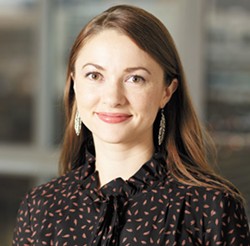While the Inland Northwest can sometimes feel like our own peculiar vortex in the space-time continuum, we're still heavily influenced by currents flowing through our country and the world at large. This is especially true in a presidential election year, when aspects of our culture are fomented into a frenzy and anxieties are running high. Fortunately, here in Spokane we not only have the tools we need to survive this mounting conflict, but if we use them, we can actually come out stronger than ever, as a people, on the other side.
Last weekend I attended the largest International Women's Day celebration in Spokane's recent memory. Renowned human rights leader Loretta Ross shared powerful insights into how we can better affect justice.
First is viewing the countless causes out there as part of a larger human rights framework. By enumerating the many types of human rights struggles under this larger tent, advocates are primed to see the intersections of their work and are more able to act in solidarity with each other to achieve collective victory.
On an individual level, intersectionality is recognizing that when multiple forms of oppression are experienced by people, they often result in compounding effects where the whole is greater than the sum of the parts. For example, the challenges of being a black woman in a racist, patriarchal society are often greater than just the challenges experienced by being a woman or being black added together. It is no coincidence that Hillary Clinton and Barack Obama have preceded the potential for a black woman leader on the national stage. Only by centering the experiences of the most marginalized can we achieve the goal of truly respecting everyone's human rights.
This is the spirit of reproductive justice, an organizing framework developed by black women that focuses on what the most oppressed people need to be able to parent any children they may choose to have in a safe and healthy environment. This is not the "oppression Olympics" as some assume; rather, it is taking an honest look at what people who are starting from different places need to enjoy the rights that we all have.
To become more aware of the unearned advantages that blind us to the needs of others, we must create new ways of approaching the issue that don't instantly trigger the lived injustices of variously privileged people. One way to accomplish this is to practice "calling in" instead of "calling out." This means approaching people with compassion and in private settings about their blind spots, rather than incidentally attacking their character and producing a defensive response.
Our Spokane NAACP chapter is dynamic and growing, students are organizing around Black Lives Matter and numerous other issues, women's groups such as the National Organization for Women are reorganizing under new leadership that embraces intersectionality and this reproductive justice lens, and civic groups such as the Spokane Interfaith Council and our Human Rights Commission are stronger than ever. We may be in for a rough ride through the election rapids ahead, but we are up to the challenge of these authoritarian waters. Grab ahold of your paddle and let's ride! ♦
Mariah McKay is a fourth-generation daughter of Spokane and a community organizer campaigning for racial, social and economic justice. She currently serves as a public health advocate.





















